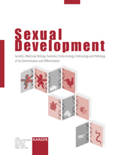
Sexual Development
metrics 2024
Connecting Genetics, Environment, and Hormones
Introduction
Sexual Development is a distinguished peer-reviewed journal published by KARGER, focusing on the intricate biological processes underpinning sexual differentiation and development across various organisms. With an ISSN of 1661-5425 and an E-ISSN of 1661-5433, the journal has established itself as a vital resource for researchers in the fields of Developmental Biology, Embryology, and Endocrinology. Hailing from Basel, Switzerland, this journal is committed to disseminating high-quality research that explores the complexities of sexual development, including genetic, environmental, and hormonal influences. With considerable recognition in the academic community, it currently holds a Q2 ranking in Embryology and Q3 rankings in both Developmental Biology and Endocrinology, Diabetes and Metabolism. Researchers and professionals are encouraged to contribute to and access its wealth of knowledge, thereby advancing understanding and discovery in this critical area of biological research. The journal's continuous publication since 2006 reflects its dedication to evolving the discourse and knowledge base surrounding sexual development, making it an essential platform for scholars in the field.
Metrics 2024
 0.57
0.57 2.40
2.40 1.90
1.90 54
54Metrics History
Rank 2024
Scopus
IF (Web Of Science)
JCI (Web Of Science)
Quartile History
Similar Journals

World Journal of Clinical Oncology
Advancing the Future of Oncology ResearchWorld Journal of Clinical Oncology, published by BAISHIDENG PUBLISHING GROUP INC, stands as a vital resource in the realm of oncology, providing a dedicated platform for the dissemination of cutting-edge research and clinical advancements. With an ISSN of 2218-4333, this journal facilitates a comprehensive exploration of modern oncology challenges and breakthroughs, targeting researchers, healthcare professionals, and students alike. Although it operates under the traditional subscription model, the impactful nature of its content is reflected in its notable ranking of 60 out of 334 in the category of Medicine _ Oncology, placing it in the 82nd percentile among peer publications. Covering significant topics in clinical oncology from 2014 to 2018, the journal has been instrumental in addressing evolving oncology practices and patient care innovations. By publishing high-quality studies, it remains an essential tool for advancing knowledge and fostering collaboration within the global oncology community.

CHROMOSOMA
Connecting Theory and Practice in Genetic ScienceCHROMOSOMA is a prestigious journal dedicated to advancing the field of genetics, published by Springer in Germany. With an ISSN of 0009-5915 and an E-ISSN of 1432-0886, this journal has been a cornerstone in the publishing landscape since its inception in 1939, serving as a critical resource for researchers and professionals interested in the intricacies of chromosomal biology. Although it operates on a subscription basis, the journal's rigorous peer-review process ensures the dissemination of high-quality research findings. With a commendable Q2 ranking in both genetic and clinical genetics categories as of 2023, CHROMOSOMA aims to bridge theoretical concepts with practical applications in medicine and biology. Researchers will appreciate its relevance, as indicated by its Scopus ranks and integration of diverse topics ranging from molecular genetics to clinical implications. By fostering collaboration and knowledge-sharing among scholars, CHROMOSOMA continues to shape the future of genetic research.
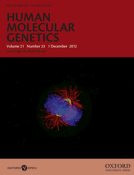
HUMAN MOLECULAR GENETICS
Transforming insights into impactful genetic research.HUMAN MOLECULAR GENETICS, published by Oxford University Press, is a premier journal in the field of genetics, with an established reputation since its inception in 1992. With an impressive Q1 ranking in various categories, including Genetics, Clinical Genetics, and Molecular Biology, this journal engages a diverse readership by reporting significant advances in our understanding of the genetic basis of human health and disease. The journal has achieved notable rankings within Scopus, particularly in Clinical Genetics, making it a key resource for professionals and researchers aiming to stay at the forefront of genetic research. Although it operates under a traditional access model, it remains committed to disseminating high-quality research that informs clinical practice and enhances knowledge in the genetic field. The journal's impact factor signifies its crucial role in shaping contemporary genetic research and its application in medicine. As the field continues to evolve, HUMAN MOLECULAR GENETICS serves not only as an academic repository but also as a vital platform for innovation and discussion among students, researchers, and clinicians.
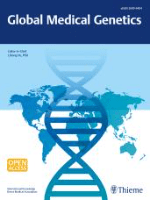
Global Medical Genetics
Transforming Healthcare Through Genetic InsightsGlobal Medical Genetics is a premier open-access journal dedicated to advancing the field of medical genetics. Published by GEORG THIEME VERLAG KG, this journal has been providing a dynamic platform for disseminating cutting-edge research and clinical findings since its inception in 2020. With the ISSN 2699-9404, it serves as an essential resource for researchers, healthcare professionals, and students who seek to explore the complex interplay between genetics and medicine. The journal aims to foster collaboration and innovation in the genetics community, addressing a diverse range of topics from genetic disorders to the application of genomics in personalized medicine. By providing open access to its content, Global Medical Genetics enhances knowledge sharing and accelerates advancements in healthcare, making it a vital asset for anyone invested in the future of genetics.

GENOME RESEARCH
Illuminating the Pathways of Molecular BiologyGenome Research, published by Cold Spring Harbor Laboratory Press, stands as a premier journal in the field of genetics, featuring rigorous peer-reviewed research that explores the complexities of genome organization and function. With an impressive Q1 ranking in both Genetics and Clinical Genetics according to the 2023 category quartiles, this journal effectively bridges the gap between fundamental genetic science and its clinical applications. Its significance is further highlighted by its Scopus rankings, where it ranks #6 out of 99 in Clinical Genetics and #27 out of 347 in Biochemistry, Genetics, and Molecular Biology, showcasing its broad influence and access to cutting-edge discoveries. Researchers and professionals can look forward to a diverse array of articles that cover genomic technologies, bioinformatics, and translational genomics. Although not currently open access, the wealth of information available in each issue makes it an invaluable resource for anyone engaged in genetic research and applications.

EVOLUTION & DEVELOPMENT
Bridging Evolution and Development for a Deeper Understanding of Life.EVOLUTION & DEVELOPMENT is a prestigious academic journal published by WILEY, focusing on the intricate interplay between evolutionary and developmental processes. With an ISSN of 1520-541X and an E-ISSN of 1525-142X, this journal has established itself as a leading source of scholarly articles since its inception in 1999. It enjoys a Q2 ranking in Developmental Biology and a remarkable Q1 ranking in Ecology, Evolution, Behavior and Systematics, positioning it among the top-tier journals in these fields, as evidenced by its Scopus rankings, notably the 26th percentile in Developmental Biology. Researchers and practitioners benefit from high-quality peer-reviewed articles that push the boundaries of knowledge and foster interdisciplinary collaboration. While open access options are not currently available, the journal's robust visibility and impact factor underscore its importance in advancing understanding within the biological sciences. The editorial objective of EVOLUTION & DEVELOPMENT is to bridge the gap between evolution and development, integrating findings that elucidate the paths of organismal change. The journal is a must-read for anyone dedicated to exploring the complexities of life sciences, making it an invaluable resource for researchers, professionals, and students alike.
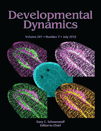
DEVELOPMENTAL DYNAMICS
Advancing the Frontiers of Developmental BiologyDEVELOPMENTAL DYNAMICS is a prominent journal in the field of Developmental Biology, published by WILEY. This esteemed journal, identifiable by its ISSN 1058-8388 and E-ISSN 1097-0177, provides a critical platform for the dissemination of innovative research covering cellular and developmental processes across diverse biological systems. With a 2023 impact factor placing it in the Q2 category of Developmental Biology and an impressive Scopus rank of #39/82, the journal plays a vital role in advancing knowledge and fostering collaboration among researchers, professionals, and students. Although it is not an open-access publication, DEVELOPMENTAL DYNAMICS remains a cornerstone in the academic community, particularly for those dedicated to understanding the complexities of biological development. The journal's convergence from 1992 to 2024 reflects its longstanding commitment to high-impact research that influences both theoretical and practical applications in the field.
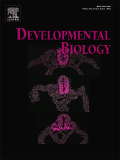
DEVELOPMENTAL BIOLOGY
Advancing the Frontiers of Developmental ResearchDEVELOPMENTAL BIOLOGY, published by Academic Press Inc., Elsevier Science, stands as a pivotal journal in the fields of cell biology, developmental biology, and molecular biology since its inception in 1959. Renowned for its rigorous peer-review process, this journal serves as a platform for publishing cutting-edge research, reviews, and insights that drive forward our understanding of developmental processes at the cellular and molecular levels. With an impressive track record, it is classified in the Q2 quartile across multiple categories, reflecting its significant impact and relevance in academia and research communities. Although the journal does not provide Open Access options, it remains accessible via numerous academic databases, ensuring a wide reach for researchers, professionals, and students alike. With a commitment to advancing the field, DEVELOPMENTAL BIOLOGY continues to be essential reading for those looking to stay at the forefront of developmental research and its applications.

JOURNAL OF MOLECULAR ENDOCRINOLOGY
Illuminating the Complexities of Hormonal InteractionsJOURNAL OF MOLECULAR ENDOCRINOLOGY, published by BIOSCIENTIFICA LTD, is a prestigious academic journal that has made significant contributions to the fields of endocrinology and molecular biology since its inception in 1988. With an impressive impact factor that places it in the Q1 category for Endocrinology and Q2 for Molecular Biology, this journal is recognized for its rigorous peer-reviewed research that addresses key questions at the intersection of molecular mechanisms and hormonal regulation. The journal's accessibility within the Scopus rankings, notably positioned 45th out of 128 in Endocrinology, highlights its relevance and influence in shaping contemporary scientific discourse. Although the journal does not currently offer open access options, it remains an essential resource for researchers, professionals, and students eager to explore groundbreaking discoveries and advancements in the hormonal sciences. The JOURNAL OF MOLECULAR ENDOCRINOLOGY continues to pave the way for critical exploration and innovation, ensuring its place as a vital publication for the advancement of knowledge in molecular endocrinology.

Reproductive Biology
Connecting Science to Conservation and BiotechnologyReproductive Biology is a premier academic journal published by Elsevier, dedicated to advancing the field of reproductive science. With an ISSN of 1642-431X and an E-ISSN of 2300-732X, this journal has been serving the scientific community since its inception in 2001. It notably holds a Q1 ranking in Animal Science and Zoology as of 2023, underscoring its significant impact and prominence in this domain. The journal encompasses a wide array of topics surrounding reproductive biology, including but not limited to endocrinology and developmental processes, making it an essential resource for researchers and practitioners. Although it operates under a traditional access model, its comprehensive scope offers valuable insights that contribute to advancements in reproductive health, animal conservation, and biotechnology. Published in the Netherlands, Reproductive Biology aims to foster interdisciplinary collaboration and innovation, ultimately enriching our understanding of reproductive mechanisms across various species. Researchers, professionals, and students alike will find this journal an indispensable platform for disseminating groundbreaking research and engaging with the latest findings in reproductive science.